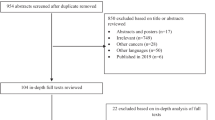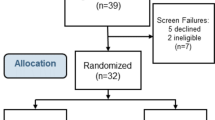Abstract
Longitudinal data from 195 breast cancer survivors were used to identify factors affecting the level and rate of change in quality of life after completion of treatment. Women were interviewed up to four times at approximately yearly intervals using Kaplan and Bush's Quality of Well Being instrument (QWB). Random coefficient regression analysis was used to model QWB as a function of time since diagnosis and personal characteristics. QWB scores decreased over time and the rate of decline increased with age (p = 0.032). This was similar to declines in women with benign breast biopsies, but overall QWB levels were lower in women with breast cancer. Having a spouse tended to slow the rate of decline in breast cancer survivors (p = 0.004). The presence of comorbidity was associated with significantly lower QWB levels (p = 0.037) but did not affect the rate of change over time. Education, family history of breast cancer, cancer stage and treatment modalities were not significantly related to QWB levels or rates of change. Breast cancer survivors experience a reduction in quality of life that persists for years after treatment and is similar in magnitude to that associated with other health problems.
Similar content being viewed by others
References
Greenlee RT, Murray T, Bolden S, Wingo PA. Cancer statistics, 2000. CA Cancer J Clin 2000; 50: 7–33.
Ward SE, Viergutz G, Tormey D, deMuth J, Paulen A. Patients' reactions to completion of adjuvant breast cancer therapy. Nurs Res 1992; 41:362–366.
Ferrell BR, Dow KH, Leigh S, Ly J, Gulasekaram, P. Quality of life in long-term cancer survivors. Oncol Nurs Forum 1995; 22: 915–922.
Omne-Ponten M, Holmberg L, Sjoden PO. Psychosocial adjustment among women with breast cancer stages I and II: six-year follow-up of consecutive patients. J Clin Oncol 1994; 12: 1778–1782.
Leedham B, Ganz PA. Psychosocial concerns and quality of life in breast cancer survivors. Cancer Investig 1999; 17: 342–348.
Hoskins CN, Budin WC, Maislin G. Medical factors and patterns of adjustment to breast cancer. Psycooncology 1996; 5: 31–44.
Vinokur AD, Threatt BA, Vinokur-Kaplan D, Satariano WA. The process of recovery from breast cancer for younger and older patients: Changes during the first year. Cancer 1990; 65: 1242–1254.
Wenzel LB, Fairclough DL, Brady MJ, et al. Age-related differences in the quality of life of breast carcinoma patients after treatment Cancer 1999; 86: 1768–1774.
Mor V, Malin M, Allen S. Age differences in the psychosocial problems encountered by breast cancer patients. J Natl Cancer Inst Monogr 1994; 65: 191–197.
Ganz PA, Lee JJ, Sim MS, Polinsky ML, Schag CA. Exploring the influence of multiple variables on the relationship of age to quality of life in women with breast cancer. J Clin Epidemiol 1992; 45: 473–485.
Young-McCaughan S. Sexual functioning in women with breast cancer after treatment with adjuvant therapy.Cancer Nurs 1996; 19: 308–319.
Bower JE, Ganz PA, Desmond KA, Rowland JH, Meyerowitz BE, Belin TR. Fatigue in breast cancer survivors: Occurrence, correlates, and impact on quality of life. J Clin Oncol 2000; 18: 743–753.
Ganz R, Rowland JH, Desmond, K, Meyerowitz BE, Wyatt GE. Life after breast cancer: Understanding women's health-related quality of life and sexual functioning. J Clin Oncol 1998; 16: 501–514.
Kaplan RM, Bush JW. Health-related quality of life measurement for evaluation research and policy analysis. Health Psychol 1982; 1: 61–80.
Kaplan RM, Bush JW, Berry CC. The reliability, stability and generalizability of a health status index. American Statistical Association, Proceedings of the Social Sciences Section 1978; 704–709.
Rutter CM, Elashoff RM, Analysis of longitudinal data: Random coefficient regression modeling. Stat Med 1994; 13: 1211–1231.
Littell RC, Milliken GA, Stroup WW. Wolfinger RD. SAS System for Mixed Models. SAS Institute Inc., Cary, NC, 1996.
Yancik R, Ganz PA, Varricchio CG, Conley B. Perspecives on comorbidity and cancer in older patients: Approaches to expand the knowledge base. J Clin Oncol 2001; 19: 1147–1151.
Marcus AC, Garrett KM, Cella D, et al. Telephone counseling of breast cancer patients after treatment: A description of a randomized clinical trial. Psychooncol 1998; 7: 470–482.
King MT, Kenny P, Shiell A, Hall J, Boyages J. Quality of life three months and one year after first treatment for early stage breast cancer: Influence of treatment and patient characteristics. Qual Life Res 2000; 9: 789–800.
Andrykowski MA, Curran SL, Studts JL, et al. Psychosocial adjustment and quality of life in women with breast cancer and benign breast problems: a controlled comparison. J Clin Epidemiol 1996; 49: 827–834.
Ganz PA, Rowland JH, Meyerowitz BE, Desmond KA. Impact of different adjuvant therapy strategies on quality of life in breast cancer survivors. Recent Results Cancer Res 1998; 152: 396–411.
Hann DM, Garovoy N, Finkelstein B, Jacobsen PB, Azzarello LM, Fields KK. Fatigue and quality of life in breast cancer patients undergoing autologous stem cell transplantation: a longitudinal comparative study. J Pain Symptom Manage 1999; 17: 311–319.
Kaplan RM, Anderson JP, Ake CF. Gender differences in quality-adjusted life expectancy: Results from the National Health Interview Survey. Clin J Women's Health 2001; 1: 191–198.
Schwartz CE, Kaplan RM, Anderson JP, Holbrook T, Genderson MW. Covariation of physical and mental symptoms across illnesses: Results of a factor analytic study. Ann Behav Med 1999; 21: 122–127.
Patterson TL, Kaplan RM, Grant I, et al. Quality of wellbeing in late-life psychosis. Psychiatry Res 1996; 63: 169–181.
Patterson TL, Shaw W, Semple SJ, et al. Health-related quality of life in older patients with schizophrenia and other psychoses: Relationships among psychosocial and psychiatric factors. Intl J Geriatr Psychiatry 1997; 12: 452–461.
Kaplan RM, Ganiats TG, Sieber WJ, Anderson JP. The quality of well-being scale: Critical similarities and differences with SF-36. Int J Qual Health Care 1998; 10: 509–520.
Pyne JM, Patterson TL, Kaplan RM, Gillin JC, Koch WL, Grant I. Assessment of the quality of life of patients with major depression. Psychiatr Serv 1997; 48: 224–230.
Worden JK, Mickey RM, Vacek PM, et al. Evaluation of a breast screening promotion project. Prev Med (in press).
Foster RS Jr, Farwell ME, Costanza MC. Breast conserving surgery for breast cancer: patterns of care in a geographic region and estimation of potential applicability. Ann Surg Oncol 1995; 2: 275–280.
Author information
Authors and Affiliations
Rights and permissions
About this article
Cite this article
Vacek, P.M., Winstead-Fry, P., Secker-Walker, R.H. et al. Factors influencing quality of life in breast cancer survivors. Qual Life Res 12, 527–537 (2003). https://doi.org/10.1023/A:1025098108717
Issue Date:
DOI: https://doi.org/10.1023/A:1025098108717




